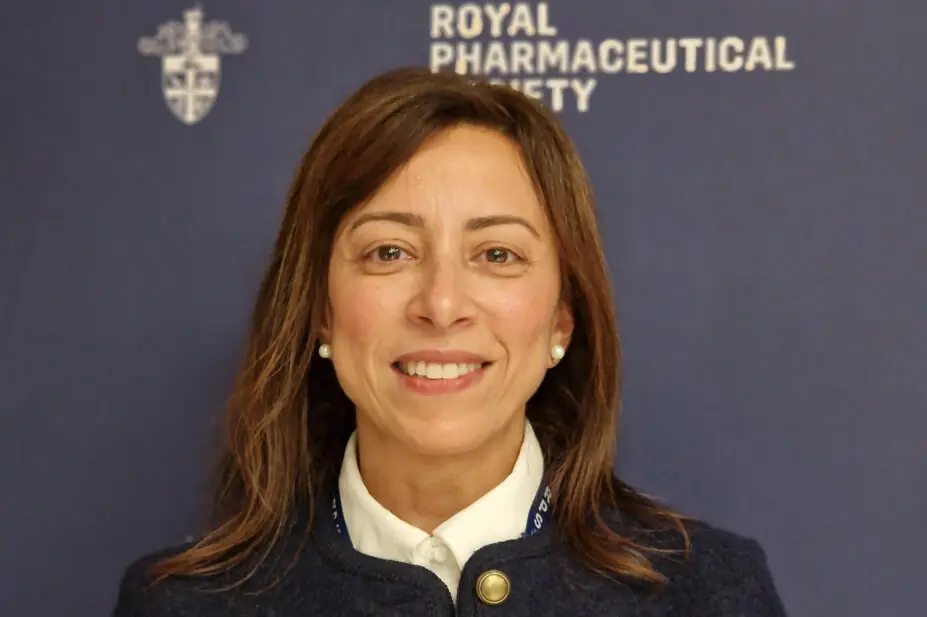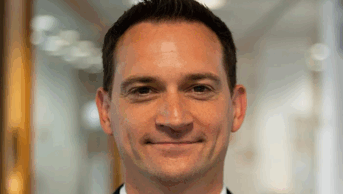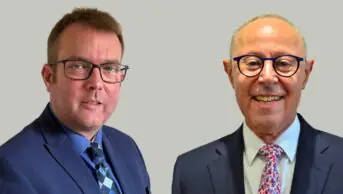
Royal Pharmaceutical Society
As an internationally renowned specialist pharmacist in substance misuse, Amira Guirguis brings a wide range of expertise to her new role as chair of the Royal Pharmaceutical Society (RPS)’s science and research committee.
Guirguis, who holds a PhD in novel psychoactive substances detection from the University of Hertfordshire, has made significant contributions to the field of pharmacy and drug policy, with her groundbreaking research into legal high substances earning her the ‘Joint Pharmaceutical Analysis Group (JPAG) Geoffrey Phillips Award’ in 2014.
She served as the principal investigator for the first home office-licensed pharmacist-led drug-checking service in the UK and was included in The Pharmaceutical Journal’s first Women to Watch list in 2020.
As the current MPharm programme director at Swansea University Medical School, Guirguis is driven to advance the pharmacy profession by putting pharmaceutical science and research at the forefront.
The Pharmaceutical Journal sat down with Guirguis to discuss the evolving pharmacy profession, how government can identify concerning drug use more quickly, and what is on the horizon for the science and research committee.
What will your new role involve and what can members of the Royal Pharmaceutical Society expect from you as the chair?
It’s about implementing the duties that are outlined by the science and research committee — such as providing advice, providing leadership and supporting the RPS assembly in strategy — and to ensure that we can respond promptly to emerging trends in pharmaceutical science.
We need to be able to facilitate impactful collaborations with key stakeholders to ensure that we are aligning with the initiatives of the RPS board and the assembly.
We work together with one shared vision, which is to promote pharmacy and to overcome the challenges that face pharmacists every day
Through this, I really hope to promote the pharmacy interdisciplinary collaborations. I would like to collaborate with the royal colleges and key stakeholders to create a network that can help pharmacists to get into research and regard the science and research committee as a credible source of information on medicines.
What projects is the committee currently working on?
There are a lot of things that are changing in the post-Brexit pharmacy landscape: how this affects the supply chain and the current medicine shortages, but also looking at all the advancement in pharmaceutical science.
I’m also thinking about all the changes in pharmacy services and user demands in relation to advancements in healthcare, like point-of-care testing, personalised medicines and genomics. How the current services are expanding and how we can help provide timely advice and represent a source of expert advice in these areas.
Of course, we have the emerging cohort of independent prescribers and all the challenges associated with that. There are also the pharmacists aspiring to become consultants. The science and research committee will be looking at how we can actually help with informing and promoting pharmacy research, which is one of the pillars that pharmacy consultants must have.
What are the committee’s major challenges?
There are several challenges. One of them is about the change mentioned earlier, in the landscape of post-Brexit pharmacy and how we are able to address all of the issues that are emerging from this change. We need to be able to balance the diverse perspectives and priorities of the committee as well as the priorities of the stakeholders.
The other thing is, we need to be able to respond to government consultations in a timely manner. We need to contribute to policy development and make sure we have meaningful contributions that are timely and, in order to do that, we need to maintain transparent communication.
At the end of the day, we work together with one shared vision, which is to promote pharmacy and to overcome the challenges that face pharmacists every day.
As director of the MPharm programme at the University of Swansea, what challenges are the university experiencing as it starts preparing students to become independent prescribers from registration?
Ensuring that the curriculum meets the learning outcomes of the General Pharmaceutical Council (GPhC), that my students are going to be prescriber ready and are going to be able to start their foundation training with 90 hours of prescribing under supervision and become prescribers on registration is extremely challenging.
We have done several things to ensure our students are going to be competent. One thing is that students learn about prescribing in an iterative manner. It starts from year one and focuses on science in practise, ensuring that students are not just prescribers, but they are scientist practitioners.
They should refer back to the science to inform their decision making in prescribing. And in order to do that, we have enhanced our clinical assessments to ensure that they are fit for purpose.
We are working collaboratively and very closely with Cardiff University as well and with Health Education and Improvement Wales to ensure that our students are going to have a safe transition from year four into foundation training.
To complement that, we have worked based on the GPhC recommendations to design a standard for all our competency and performance-based examinations to ensure that these exams are set in a similar way to the GPhC assessment papers, which can have a pass mark that varies based on the difficulty of the paper.
In March 2022, you wrote for The Pharmaceutical Journal about the need for action on the inequalities in treatment for substance misuse among LGBTQ+ people. Has there been any progress on this?
It is a very important topic that has hardly been addressed. Since then, I became an independent prescriber for people with heroin and alcohol addictions and I try as much as possible in my practise as a prescriber to ensure I not only observe and respect the diversity of my patients, but see and find out different ways of supporting them.
As pharmacists, it is our duty of care to ensure equal access to care among the diverse patient population
I have taken this on board in my teaching and in the programme of the undergraduate pharmacy curriculum with great seriousness. I make sure that our students appreciate the diverse patient groups and how inequality or stigma sometimes prevent people from reaching out and accessing healthcare. As pharmacists, it is our duty of care to ensure equal access to care among the diverse patient population.
Training is also taking place again among staff at Swansea to recognise, identify and address any issues related to diversity and access to healthcare.
Through the science and research committee, I would like to address this through our research strategy. This is part of the agenda at our first meeting, to look at how we are going to contribute to the science and research strategy of the RPS and include the diversity in science research.
Should the government be looking at implementing a strategy to mitigate drug deaths in England and Wales like they did in Scotland?
We focused on Scotland because the levels were super high and lots of government funding were given. Scotland designed a drug task force that have been working together for the past two to three years to reduce that number.
Why are we not doing this in England and Wales? The lack of funding is a big thing. There is also a requirement for more trained individuals. There is a massive shortage of nurses and pharmacists in drug and alcohol clinics. If we want pharmacists to play a role, we really need to have a bigger understanding of what these patients go through.
We’ve been reactive all the time. We wait until a killer drug comes onto the market. Then we start acting. We want to be more proactive. We want to use our expertise to predict what’s about to happen so that we are prepared for future threats. I think that’s very important.
Regulation of online pharmacies supplying prescription drugs has hit the headlines recently — is the government doing enough to prevent the misuse of drugs in this way?
There are a lot of steps that were taken by the government, the RPS and the GPhC. Personally, through my research, I have informed the UK government about a lot of the harmful drugs before they have come to the market through a web crawler.
A web crawler is a software that runs 24/7. It can search the surface web, analyse discussions and identify drugs or substances that are posted in more than eight languages. We are able to share this information with relevant stakeholders, and that includes national boards for controlled drugs, local intelligence networks in South Wales and so on.
So, looking at online pharmacy, recently we have seen a lot of issues related to lack of robustness in legitimate pharmacies and safe use of medicines. At national level, we have a big challenge, related to how we can ensure we have a system that can capture over-the-counter sale. However, over the counter sale is extremely difficult to manage because patients don’t leave their details when they buy anything over the counter.
This is where robust questioning and making sure that there is somebody who is really overseeing the sale of over-the-counter medicines is very important. From the GPhC perspective, the GPhC has clear guidance for owners of online pharmacies, which they should follow.
As pharmacists, we need to have the education when making sales or supply of medicines that have the potential to be misused. We also have a duty to raise public awareness around these drugs.
Do you have anything that else you want to raise?
Perhaps, the one thing I want to share, it relates to the expertise that the science and research committee is providing.
My area of passion is drug detection through smuggled drugs and seizures. As a pharmacist and a prescriber, I was invited as an expert witness for the prosecution on a huge seizure related to benzodiazepines and the information that I needed to present to court was not available in the public domain anywhere.
Basically, the sentencing guidelines do not even include benzodiazepine. It includes drugs like heroin, cocaine, whatever, and if you carry X much, you will be given X many years in prison. But if you have somebody who had ‘benzos’, what do you do? How many years would you put them in prison? One year or 20 years? There isn’t any guidance.
I was able to bring the pharmacy knowledge to calculate things that the company refused to share in the public domain, looking at the therapeutic index, the science behind the drugs and the vulnerability of people who are using them, and provide that insight.
So, when a pharmacist is needed for expert advice about the drug, I think I’ve seen this at a top level. I feel that pharmacists are so diverse in terms of the skills and competencies they have. They can do so much, but we’re not using them to the maximum of their potential.
You may also be interested in

Ngozi Kalu: ‘When research lacks representation, findings become biased and inequalities emerge’

Henry Gregg: ‘The only way to slow down pharmacy closures is to start closing that £2.6bn funding gap’
